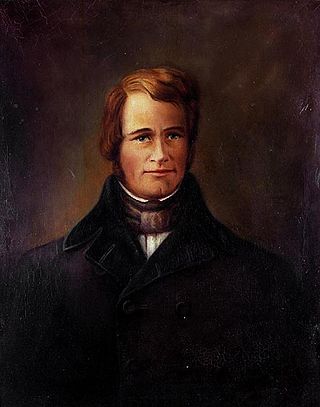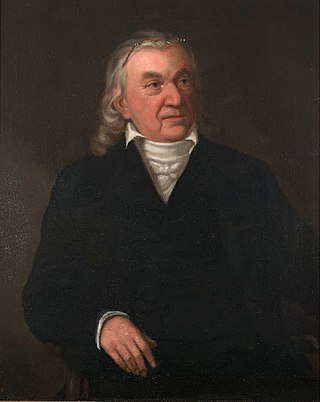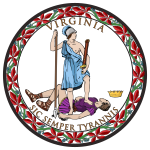
Thomas Nelson Jr. was a Founding Father of the United States, general in the Revolutionary War, member of the Continental Congress, and a Virginia planter. In addition to serving many terms in the Virginia General Assembly, he twice represented Virginia in the Congress, where he signed the Declaration of Independence in 1776. Fellow Virginia legislators elected him to serve as the commonwealth's governor in 1781, the same year he fought as a brigadier general in the siege of Yorktown, the final battle of the war.

John Page was an American politician. He served in the U.S. Congress and as the 13th Governor of Virginia.

The 1985 New Jersey gubernatorial election was held on November 5, 1985. Incumbent Republican Governor Thomas Kean won a landslide re-election against the Democratic candidate, Essex County Executive Peter Shapiro. As of 2025, Kean's is the largest margin in terms of percentage and raw votes in all New Jersey gubernatorial elections. Kean was the first Republican to be re-elected governor since 1949, and the first Republican to ever win two four-year terms.

The 1948 South Dakota gubernatorial election was held on November 2, 1948. Incumbent Republican Governor George T. Mickelson ran for re-election to a second term. He was opposed by Democrat Harold J. Volz, a businessman and the former chairman of the Tripp County Democratic Party. Both Mickelson and Volz were the only candidates of their parties to file for Governor, ensuring that they won their respective nominations unopposed and removing the race from the primary ballot. In the general election, Mickelson had little difficulty defeating Volz. Though Republican presidential nominee Thomas E. Dewey only narrowly won the state over President Harry S. Truman, Mickelson's popularity allowed him to win re-election in a landslide, receiving 61% of the vote to Volz's 39%.

The 1944 South Dakota gubernatorial election was held on November 7, 1944. Incumbent Republican Governor Merrell Q. Sharpe ran for re-election to a second term. He was opposed Lynn Fellows, a former State Representative from Aurora County the 1942 Democratic nominee for Attorney General, in the general election; both Sharpe and Fellows won their primaries unopposed. In the general election, Sharpe easily defeated Fellows, far outpacing even Republican presidential nominee Thomas E. Dewey, who won the state in a landslide.

United States gubernatorial elections were held on November 5, 2024, in 11 states and two territories. The previous gubernatorial elections for this group of states took place in 2020, except in New Hampshire and Vermont, where governors only serve two-year terms and elected their governors in 2022. In addition to state gubernatorial elections, the territories of American Samoa and Puerto Rico held elections for their governors. This was also the first time since 1988 that a Republican nominee won the gubernatorial election in American Samoa and also the first time since 1996 that an incumbent governor there lost re-election.

The 1842 Virginia gubernatorial election was held on 15 December 1842 in order to elect the Governor of Virginia. Democratic nominee and former member of the Virginia House of Delegates James McDowell won the election in the Virginia General Assembly as he ran unopposed.

The 1840 Virginia gubernatorial election was held on 1 March 1840 in order to elect the Governor of Virginia. Whig nominee and 18th Speaker of the Virginia House of Delegates Thomas Walker Gilmer won the election in the Virginia General Assembly as he ran unopposed.

The 1834 Virginia gubernatorial election was held on 1 March 1834 in order to elect the Governor of Virginia. Democratic nominee and former United States Senator from Virginia and President pro tempore of the United States Senate Littleton Waller Tazewell won the election in the Virginia General Assembly as he ran unopposed.

The 1810 Virginia gubernatorial election was held on 30 November 1810 in order to elect the Governor of Virginia. Incumbent Democratic-Republican Governor of Virginia John Tyler Sr. won re-election in the Virginia General Assembly as he ran unopposed.

The 1803 Virginia gubernatorial election was held on 30 November 1803 in order to elect the Governor of Virginia. Incumbent Democratic-Republican Governor of Virginia John Page won re-election in the Virginia General Assembly as he ran unopposed.

The 1798 Virginia gubernatorial election was held on 30 November 1798 in order to elect the Governor of Virginia. Incumbent Federalist Governor of Virginia James Wood won re-election in the Virginia General Assembly as he ran unopposed.

The 1795 Virginia gubernatorial election was held on 30 November 1795 in order to elect the Governor of Virginia. Incumbent Democratic-Republican Governor of Virginia Robert Brooke won re-election in the Virginia General Assembly as he ran unopposed.

The 1790 Virginia gubernatorial election was held on 30 November 1790 in order to elect the Governor of Virginia. Incumbent Governor of Virginia Beverley Randolph won re-election in the Virginia General Assembly as he ran unopposed.

The 1789 Virginia gubernatorial election was held on 30 November 1789 in order to elect the Governor of Virginia. Incumbent Governor of Virginia Beverley Randolph won re-election in the Virginia General Assembly as he ran unopposed.

The 1781 Virginia gubernatorial election was held on 30 November 1781 in the U.S state of Virginia in order to elect the Governor of Virginia. Incumbent Speaker of the Virginia House of Delegates Benjamin Harrison V won the election in the Virginia General Assembly as he ran unopposed.

The 1780 Virginia gubernatorial election was held on 29 May 1780 in order to elect the Governor of Virginia. Incumbent Governor of Virginia Thomas Jefferson won re-election in the Virginia General Assembly as he ran unopposed.

The 1779 Virginia gubernatorial election was held on 29 May 1779 in order to elect the Governor of Virginia. Incumbent member of the Virginia House of Delegates from Albemarle County Thomas Jefferson won the election in the Virginia General Assembly as he ran unopposed.

The 1778 Virginia gubernatorial election was held on 29 May 1778 in order to elect the Governor of Virginia. Incumbent Governor of Virginia Patrick Henry won re-election in the Virginia General Assembly as he ran unopposed.

The 1781 Rhode Island gubernatorial election was held on 4 April 1781 in order to elect the governor of Rhode Island. Incumbent Independent governor William Greene won re-election as he ran unopposed. The exact number of votes cast in this election are unknown.

















